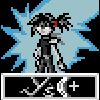Alright so AI is basically logic. Unless you have some syntax or impanation problem you need to set priorities and think about how you want the AI to think.
Here is something I would try.
First I would read the health of the player to see what is best suited for killing them.If the player has really high health and a single big sword swing won't give the AI an advantage I would make it choose second best to save points If the player is on it's last leg about to die I would have the AI go all out to ensure the player will die If the player has a chance to be killed by a big sword swing but the AI doesn't have enough points I would make it choose the light attack to build up quickly
AI is just logic and you should think about what's the most effective way to get the result you want which mainly involve killing the player.










